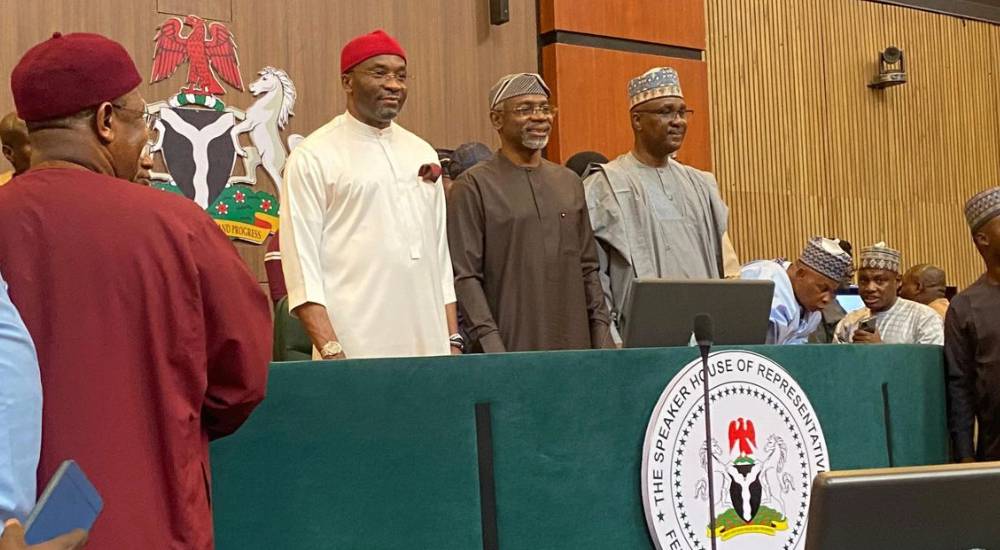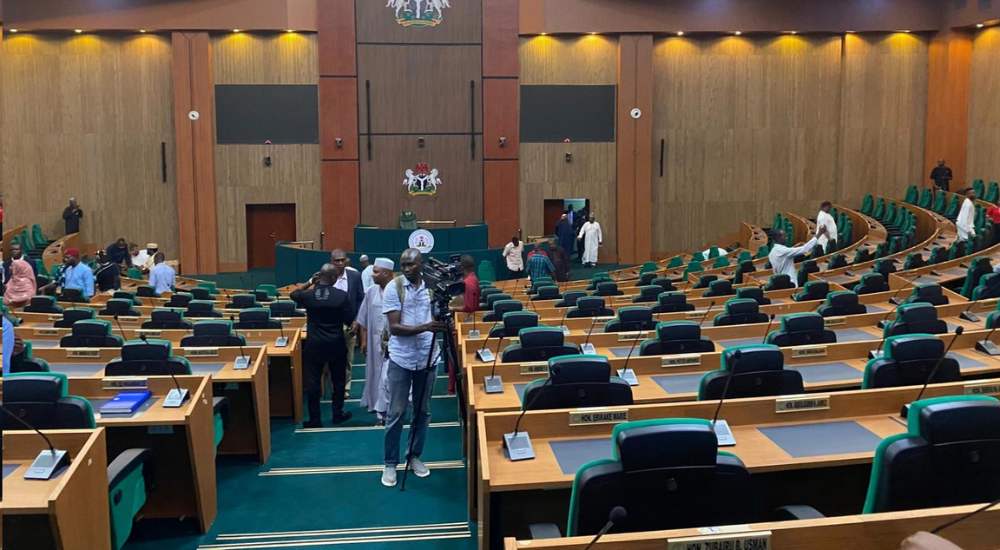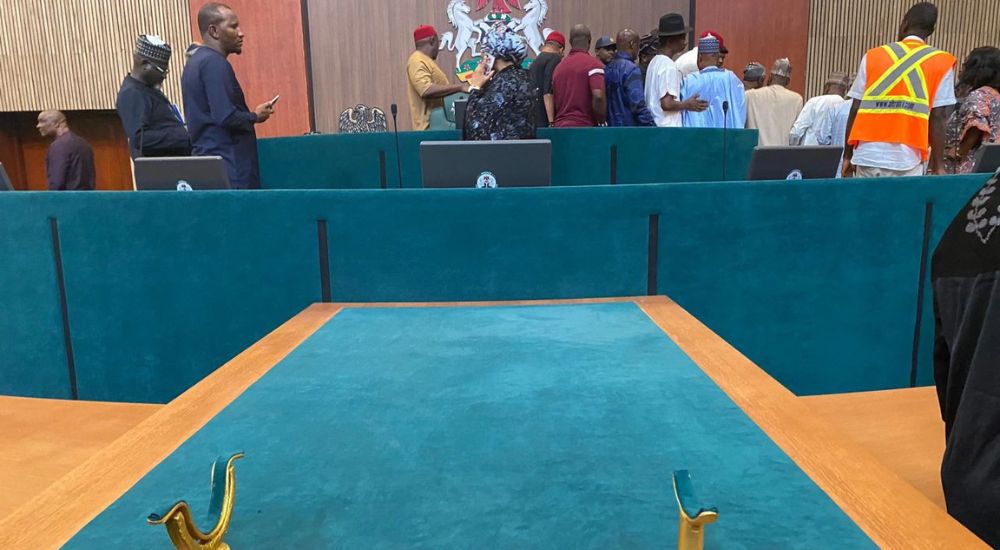The Nigerian National Petroleum Company Limited on Monday began offloading 240 million litres of Premium Motor Spirit, otherwise called petrol, as it stepped up efforts to tackle the worsening nationwide petrol scarcity.
As the NNPCL began offloading petrol, filling stations sold the product at an average price of N800 per litre in various locations.
One of our correspondents gathered that the 240 million litres of petrol imported into the country came in through five vessels, which were offloaded into five depots on Monday.
The South-West Regional Coordinator of the Nigerian Midstream and Downstream Petroleum Regulatory Authority, Ayo Cardoso, confirmed this in an interview with The PUNCH on Monday.
The PUNCH reported on Monday that despite claims by the NNPC that the logistic issues causing fuel scarcity had been addressed, Nigerians in Lagos and other parts of the country still struggled to get fuel as many filling stations remained shut.
The PUNCH independently gathered that the situation might worsen in Lagos and other parts of the South-West because there was a directive by the NNPC that fuel trucks must first service the Federal Capital Territory before any other places.
According to oil sector sources, hundreds of trucks loaded were sent to Abuja on Sunday based on the NNPC directive.
Our correspondents who visited filling stations across the country on Monday observed that many outlets hiked their pump prices, selling a litre of petrol between N650 and over N1,000.
As the stations increased the pump prices of fuel, it was learnt that black marketers also used the opportunity to make brisk business, selling a litre of petrol at prices of over N1,200/litre, depending on the location and the bargaining strength of the buyer.
It was also observed that the hardship being encountered as a result of fuel scarcity worsened on Monday. The queues in filling stations became longer as work resumed across the nation for the new week.
The fuel scarcity also coincided with the resumption of public schools in some states, adding to the burden on parents, teachers and school owners.
Speaking with The PUNCH, the NMDPRA regional coordinator said the agency was doing its best to ensure Nigerians were not exploited by filling stations.
“We are doing something about the fuel crisis; very soon it will be over. Vessels are discharging as I am talking to you. What we are concentrating on is to push the NNPC, which is the supplier of last resort, to make sure they wet the entire populace.
“So, we have about five vessels already discharging the product, about 240 million litres are being discharged as I am talking to you right now. We are working round the clock.
“But then, once you have a problem, it takes like one or two weeks to (normalise), but people will keep on panicking, which is not supposed to be. All these kinds of things disrupt the normal way of operations. But with 240 million litres coming in from five vessels discharging to five depots already today, things will get back to normal,” Cardoso assured Nigerians.
Scarcity spreads
Our correspondents noted that the few filling stations dispensing fuel on Monday were crowded by private and commercial drivers, motorcyclists as well as individuals with jerry cans.
The queues were seen in Abuja as well as Lagos, Ogun, Niger, Nasarawa, Gombe and other states.
The Heyden filling station in Iperu Remo, Ogun State sold petrol at N650 per litre on Monday amid fights among buyers who thronged the station from places like Isara, Ode, Ilishan and others.
A motorist, who spoke to one of our correspondents, said he had been in the queue since 5am, yet he was unable to buy petrol as at noon.
“Look at me, I have been here since 5am, yet I couldn’t get fuel up till noon. I came here from Isara. There is no fuel in other places. This station belongs to the governor, maybe that’s why it is selling at the rate of N650 per litre. A few others around us sell petrol for N800 or more,” the motorist, who identified himself as Ismail, told The PUNCH.
A young man dressed in TotalEnergies uniform was sighted at the Heyden filling stations with two jerry cans filled with PMS.
The man, who did not reveal his name, stated, “I came here to buy fuel because we don’t have fuel in our station. I spent hours in the queue despite being an attendant myself. We don’t know why there is no fuel, but we heard that everybody is waiting for May 1 to know if the president would say something about fuel price reduction or not”.
At WB One Oil & Gas in Ogere, the crowd was not much as a result of the price differential between it and Heyden. The filling station sold a litre of petrol at N900 as of Monday morning.
“I can’t buy at WB One. N900 is too much for a litre. That is why the people there are not many. I would rather join the queue instead of paying N900 for a litre,” Adamu, an okada rider said.
The NNPC retail outlet along the Sagamu-Interchange axis was occupied by buyers who wanted to get the product at N580/litre.
Selling at N670, the As-Sallam filling station near the NNPC also had a long queue. The NIPCO and AP stations near the RCCG Bus Stop did not open for business.
Commuters heading to work, schools, and various destinations in Abeokuta, the Ogun State capital on Monday found themselves stranded due to the effect of the lingering fuel scarcity.
Many bus stops were filled with passengers trying to board vehicles to schools and places of work.
Our correspondents learned that some filling stations around Rounda and Lafenwa were selling the product for N1,000/litre.
A cab driver, Mr Banji Alaba, said “The fuel problem has continued to worsen, some filling stations in Rounda and Lafenwa area are selling a litre for N1,000. Though we have a few selling for between N750 to N800 the queue is killing. The NNPC filling stations are selling for N580 but my friend who has been at one of the stations since 9 am is yet to buy fuel as of 4 pm when I called him.
“The queue is so much and overwhelming. The cabs outside are few because many drivers are at the filling stations and some who don’t have the strength to spend hours at filling stations have parked their cars. How do we feed our families?
“The schools have just resumed and a lot of us want to pay our children’s school fees, how do we do that if we don’t work? It is really frustrating and sad.”
Some students were also sighted trekking home because they could not get cabs on time while those who offered to carry them increased the fare by 70 per cent.
The Total filling station at Toll Gate, along the Lagos-Ibadan Expressway, in Ogere sold petrol for N1,200/litre on Monday.
Also, Danco filling station and NNPC at Magboro, Ogun State, sold for N610 and N580 respectively. While others like TAS, Mobil, Osadol, Heyden, Amuf oil, Rainoil, and NIPCO among others were under lock and key.
Black marketers took advantage of the situation to sell the product at exorbitant prices ranging from N1,300 to N1,800/litre.
Our correspondents, who went around major cities, saw miscreants threatening to burn down some filling stations perceived to be hoarding the product.
Motorists described the situation as pathetic, calling on the government for an urgent intervention to avoid possible implosion.
The PUNCH reports that a motorist at a Mobil fuel station in Ikotun, Lagos, who gave his name as Mr Valentine, said, “Though none of the fuel stations have started selling, I heard they sold for N1,050 per litre earlier”.
A resident at Egbeda, Lagos, who simply gave her name as Peace Adeola, said commercial vehicle operators started raising their fares on Sunday.
According to the resident, moving from Ikotun to Egbeda on Sunday went for N600 as against N300 before now.
“The bus drivers and conductors were complaining, saying they bought the fuel at an expensive rate of N900. We trekked home from Egbeda,” Adeola recounted.
Also speaking, another resident of Egbeda, Ignatius Uzonna, told one of our correspondents on Monday that the government-owned BRT buses now recorded a high number of passengers due to the scarcity of private commercial buses.
Our correspondents observed that a litre of fuel at the black market was sold for N900/litre in Apapa, while an outlet belonging to Saddeh at Egbe Bus Stop along Ikotun-Ejigbo road, sold for N1,000/litre.
The God’s Decision outlet along Governor’s Road in Ikotun Lagos also sold petrol for N900/litre on Monday.
In Gombe State, residents frowned at the incessant increment in petroleum prices as fuel sold across the state at N900/litre in a few operating filling stations, and N1,400 at the black market.
An okada rider, Mohammed, said, “We are suffering and it’s unfortunate we buy fuel at N1,400 because we can’t stay in long queues at the filling station.”
In Makurdi, the Benue State capital, one of our correspondents reports that the few filling stations that opened for business sold petrol between N750 and N850/litre on Monday. Though, there were no long queues at the filling stations.
It was a similar development in Otukpo and Gboko, the two major urban centres in the state, where the cost of transportation had gone up.
The petrol scarcity in Ondo State affected business activities across the state with commercial drivers slightly increasing their fares by 50 per cent. Commuters who could not afford the fares were observed to be trekking a long distance to their various destinations.
While some stations sold petrol for N750/litre, others sold at N650.
It was gathered that the fuel stations in Akwa Ibom State dispensed fuel between N700 and N740/litre across the state as of Monday.
One of our correspondents who monitored the NNPC and Fonnex filling stations in Uyo reports that, though there was no scarcity of the product, stations hiked prices.
A petrol attendant in one of the filling stations, who spoke on the condition of anonymity because he was not authorised to speak on the issue said, “There is no fuel scarcity anywhere in the state as you can see, but we are still selling at N700.”
In Ilorin, the Kwara State capital, few petrol stations with long queues of vehicles dispensed fuel for as high as N1,000/litre on Monday, while the black marketers sold a litre for as high as N1,500. The stations included Shafa, NNPC, NIPCO, and Rainoil.
However, commuters decided to trek to their destinations as okada riders charged between N500 and N2,000, depending on the distance.
Similarly, in Ekiti State, the fuel crisis bit harder on Monday as many car owners resorted to parking their vehicles at home and patronised either commercial cars or bikes.
The queue was long at the NNPC filling station along Iworoko Road which dispensed petrol at N580/litre.
A driver, simply identified as Wale, said, “It took me over two hours before I could get to the pump at NNPC along Iworoko Road. But I was disappointed the attendants were rationing the fuel and did not dispense above N10,000 worth of fuel for any vehicle.”
A car wash operator along Ado Federal Polytechnic Road said he bought five litres for N8,000.
Tunde Olomu, an okada rider, lamented, “The black-market operators are cruel. They sell at N1,000 per litre at Nova Junction and N1,200 per litre at Atikankan”.
Olomu, who said the present situation had occasioned an increase in transport fares, said, “We now charge about N400 for distances that used to be N200, and N300 for those that used to be N100 and N150. I can tell you that taxi fares have been raised as well”.
The Ekiti State Council of Nigeria Union of Journalists, at their monthly congress, called on the state government to urgently intervene.
The NUJ, in a communiqué issued at the end of the congress, called for an investigation of the cause of the scarcity, queues and high prices “with a view to punishing those engaging in sharp practices to the detriment of the citizens.”
In the same vein, fuel stations in Niger State hiked the pump price of the product following the scarcity of fuel.
The price of fuel, PUNCH learnt, was stable and there were no queues at the filling stations until Sunday when retailers got information that the price of the product in neighbouring FCT was high and motorists could not get fuel.
The stations were said to have created an artificial scarcity and also hiked the price of petrol.
PUNCH investigation on Monday showed that most of the stations in the state were selling a litre of fuel for N900 and above.
The black marketers were also sighted hawking the product for N1,100 and above.
NMDPRA reacts
Meanwhile, the NMDPRA regional coordinator, Cardoso told one of our correspondents that the agency could no longer regulate prices, saying PMS was deregulated following the removal of subsidy by President Bola Tinubu on May 29, 2023.
“For now, the price is based on supply and demand, but we are still going out to make sure that people are not exploiting consumers.
“My people are on the field; they are going round. So, if you see any specific one you think we should handle, you can let us know. But since morning, we’ve been on the field, including myself, making sure nobody is hoarding. You know once there is enough supply, all those things will be a thing of the past.
“We don’t handle price anymore; it is deregulated since the subsidy has been removed. What we do is that there is a price bound that we are monitoring. The person who can determine the price is the person who is supplying marketers, and that is the NNPCL. Once the NNPCL says this is what they are selling, we just expect that there will be some margin around the NNPCL figure and it should not be too excessive,” Cardoso said.
He further said, “If the NNPCL is selling at N580, we don’t expect anybody to sell more than N630 or N650 at worst. If you let us know those selling at N700 or N800, we will take action. But you have to know that this is happening because there is scarcity. Outside scarcity, those things will come down. We can’t use the current prices to judge what the normal price should be.
“Any station we get to, and we see hoarding, we will ask them to start selling and they have to sell at the official NNPC price.”
‘Don’t store fuel’
Meanwhile, Nigerians have been warned to stop hoarding fuel in their houses to avoid a fire outbreak.
“We want to tell everybody that they should be patient, things will get cleared very soon. We have quite enough fuel being discharged. We want to enjoin people not to store fuel at home because of the safety issues around it.
“This is a flammable product, and you cannot guarantee how to handle it if you store it in your house. People should not store petroleum products at home. There will be enough fuel very soon,” Cardoso stated.
Also, the Commissioner for Environment in Ogun State, Ola Oresanya, warned against storing fuel at home.
Oresanya advised, “It is all about safety matters. We should not be tempted to store fuel. PMS is a very volatile material and there is no second chance when it comes to the safety of lives and properties.
“So, it is better for us to endure the pains of the discomfort at the moment. Discomfort is better than loss of lives. We just want to implore our people to make sure that they don’t store fuel in the house. We should please avoid hoarding fuel to avoid any form of domestic or industrial accident”.
Kwara task force
The Kwara State Government Task Force on Monday raided some filling stations within the Ilorin metropolis, cautioning them against hoarding of fuel.
The government said the raid was part of the government’s measures to address fuel scarcity in the state.
In a statement, the Deputy Chief Press Secretary, Government House Ilorin, Mashood Agboola, noted that the committee was set up by Governor AbdulRahman AbdulRazaq to see to the problem of fuel shortage.
“As a responsible and responsive government, we cannot be folding our hands watching. We have to see that the majority of our people enjoy the dividends of democracy,” the leader of the task force and Chief of Staff at Government House, Mahe Abdulkadir, told reporters during the exercise.
Abdulkadir called on the people of the state to be patient and avoid panic-buying.
“We want to call on the people of the state to be patient and avoid panic buying. The Federal Government is not trying to increase the prices of fuel. We will make sure our people are not shortchanged,” he added.
This came as the National Association of Nigerian Students threatened to embark on mass action if the Federal Government failed to take immediate steps to address the current fuel crisis in the country.
The students’ body also asked the Group Managing Director of the Nigerian National Petroleum Company Limited, Mr Mele Kyari, to resign if he could not take decisive actions to resolve the fuel crisis.
The association’s Senate President, Babatunde Akinteye, in a statement on Monday, lamented that the fuel scarcity has left many citizens, including students, frustrated and helpless.
The NANS senate president lamented that students are now facing unprecedented challenges as a result of the increase in petrol pump prices and the scarcity of the product.
While demanding immediate action from the NNPCL to resolve the fuel crisis and restore stability, Babatunde said the students would hit the streets in protest if the situation persisted.
[Punch]


















